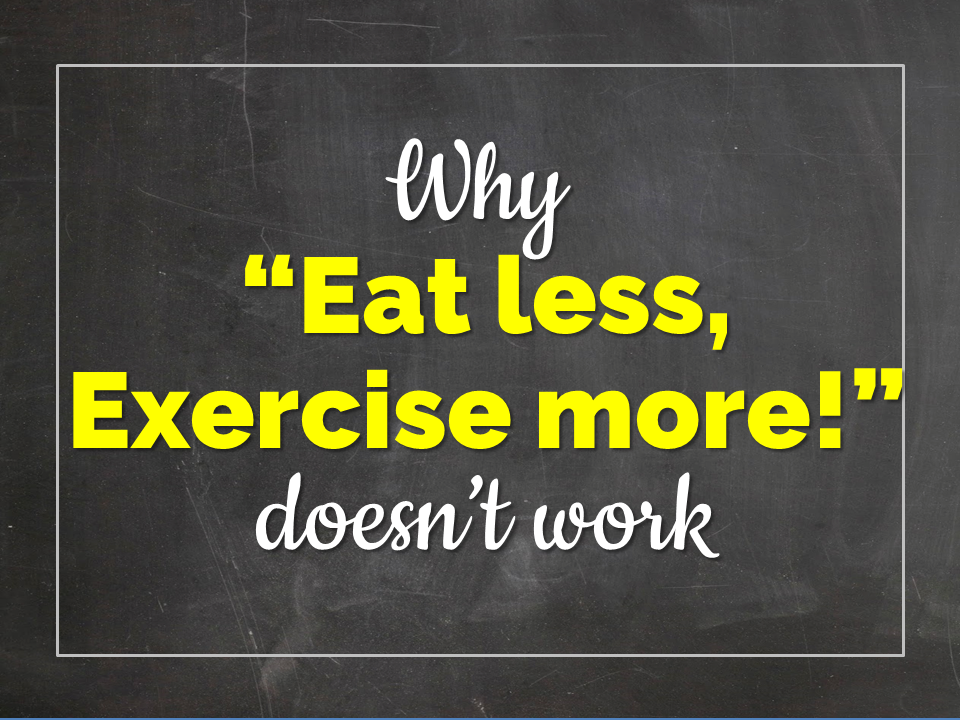It seems like this is the advice that’s we’ve been given forever for fat loss.
Just eat less and exercise more.
And it’s still popular, despite the evidence to the contrary.
It’s based on the theory of “calories in, calories out.”
Eat less calories, and burn more calories.
It’s exactly what I learned when I studied to be a personal trainer 15 years ago.
But it turns out that calories have never been the issue.
What???
Well, if you’ve ever tried to lose fat before, you may have discovered this on your own.
Maybe you’ve lost weight and gained it back, or you’ve struggled to lose weight at all.
Why does this happen?
Because fat storage is caused by unbalanced hormones, not unbalanced calories.
This is the subject of Dr. Jason Fung’s book, “The Obesity Code.”
A friend of mine suggested the book, and it just makes me even more passionate about the importance of hormone balance.
It’s useful information for anyone wanting or needing to lose fat, and in particular, belly fat
In the past couple of years, I’ve been coaching the idea of fat loss through hormone balance rather than calories in/out.
Because hormones are particularly important when we move into menopause, and belly fat can become a thing.
Once the level of our female hormones start dropping, others become more significant.
And, in this case, Dr. Fung drives home the significance of insulin.
Insulin causes body fat.
That’s a big statement.
But based on much research over decades, it appears that obesity is a condition caused by consistently high insulin levels.
It’s not a directly caused by eating too much and exercising too little.
Insulin is a major factor in fat storage.
But it’s not bad.
It’s an important hormone because its job is to shuttle nourishment (glucose) into the cells of your body (muscles, brain,…).
And that’s a good thing.
It only becomes a problem when you continually eat foods that raise insulin.
And when your insulin is elevated consistently, you develop insulin resistance.
That’s when the cells in your body that need nutrition actually begin to resist insulin.
And so, to compensate, your pancreas pumps out even more insulin to try to get the cells what they need.
And that just causes you insulin to increase even more.
Can you see where this is going?
So the question is: How do you lower your insulin levels and therefore lose fat?

Here are three ways to reduce insulin that are important, not separately, but together:
1. Intermittent Fasting
If you read my blog regularly, you’ve learned a little about fasting.
And here’s another great reason to fast: Lower insulin levels.
Fasting allows your insulin levels to drop and return to normal.
And, of course, this is great news for body fat.
Dr. Fung says that studies have shown time and time again that calorie restriction doesn’t cure obesity, but lowering the insulin in your blood does.
So, if you fast for 12 to 16 hours a day, what I’m calling intermittent fasting, you can allow your insulin to drop back to normal for periods of time.
Going from 7pm to 7am without eating is a good start.
In the book, he actually uses 24 and 36 hour fasts a few times a week with his obese patients.
But I believe in starting with something shorter, like 12 hours, and maybe work your way there, if you feel you need it.
I’ve increased my own fasts from 12 to 16 hours and I did that doing something I wouldn’t have suggested just a couple of years ago:
Leaving the house without eating breakfast.
I’d always learned that breakfast is “the most important meal of the day.”
But in fact, there’s no need to eat right after getting out of bed.
And if you’re not hungry, or you’re in a rush in the mornings, there’s even less of a reason to eat at that time.
Instead, wait until you’re hungry, and if possible, sit down to eat.
An important thing to remember here is that the fasted state, which as a society we tend to avoid, is actually an important part of our history and our physiology.
We were built to survive times without food; we weren’t built to eat continuously.
So, fasting is just as important as feasting.
But we spend too much time fed and too little time fasted.
And that means that our insulin levels stay elevated and never get a chance to return to normal.
By fasting, you allow your hormones come to a balanced state.
So, what else can you do to lower insulin levels?
In addition to intermittent fasting, choose foods that are whole.
2. Reduce or eliminate added sugar and processed foods
I know you’ve heard me say this before, but processed foods and foods with added sugar must be the first to go.
They spike your insulin like nothing else.
And by processed foods, I mean anything that’s been changed from it’s original form, usually sold in attractive packaging.
Breads, pastas, cereals, crackers, cookies, chips, cakes, pies, sodas, and so on.
You know this already, I know you do.
But not spiking your insulin and keeping it lower not only helps prevent you from gaining fat, it also prevents diabetes, and therefore your risk for other lifestyle illnesses (like heart disease and cancer.)
So you don’t need to ask me what foods are best for you.
Just reduce or remove processed foods and added sugar and you’ll be way ahead of the game!
3. Lessen your stress
Cortisol is well known as the stress hormone.
It’s function is to liberate glucose into your blood so you have the energy to run away from danger.
And cortisol actually tends to increase as you move into menopause, as progesterone, which used to help keep it in check, is lowered.
However, the dangers we’re facing nowadays aren’t usually physically life threatening.
Instead, we’re facing a lot of chronic low-level stress.
Chronic stress can come from not dealing with a difficult relationship, a job that’s demanding or makes you miserable, and personal finances or health problems.
As a result of chronic stress, you continuously release glucose into your blood, and increase your insulin levels.
So, what can you do about your stress?
Stress management is an active process; stress doesn’t go away by sitting in front of the tv or ipad.
Some things you can actively do are stopping to take a few good breaths, taking walks in nature, doing yoga or chi gong, getting regular massages, and meditating.
Basically anything that reconnects you with yourself and the natural world around you.
Exercise is also powerful at lowering stress, by pumping you up with endorphins and serotonin.
However, when it comes to losing fat, exercise isn’t where you should put most of your attention.
Surprising, right?
Finally, to better manage your stress, both therapy or coaching can support you in getting off the stress train.
So, there you have it.
According to Dr. Fung, to lose fat you need to actively do things that help lower your insulin.
It’s sounds simple, but of course, you may have built up a lifetime of resistance to doing the things that I’ve mentioned here.
And that’s exactly why I coach.
Because I know about resistance.
And I can help you become aware of your own resistance, so that you can push past it and actually make changes that matter.
And in particular, if you’re looking to lose belly fat, especially as you navigate menopause, I’m here to help.
We can work together to balance your hormones, lose fat, and get you to a level of health you didn’t think was possible at this time of your life.
It’s so empowering when you take control of your body and health, and you deserve to feel powerful in your own life.
Are you with me?
If you are, then take 30 seconds to book a free 30-minute coaching session with me this week.
Looking forward to talking to you!
Keep moving forward my friend,
Debbie
P.S. I’d love to speak to you more about this, or help you resolve a particular issue. Just book a free 30-minute coaching session with me. It’s like “try before you buy”, so you can discover what coaching is about and ask me any questions you want.
Here’s the link: https://www.momentum-fit.ca/book-a-session/



Super informative blog! I love how we are learning the real reasons behind our suffering especially during menopause. You know your stuff Debbie! Thank you for bringing this information into the light 😊
Thanks for bringing this book to my attention, Lareina! 😊
Very interesting Debbie, it is so hard to lose weight as we get older and i started doing 12h-13h fasts but struggling to get to 16h.
12-13h is pretty great, Nadia! Have you noticed any benefits from fasting?